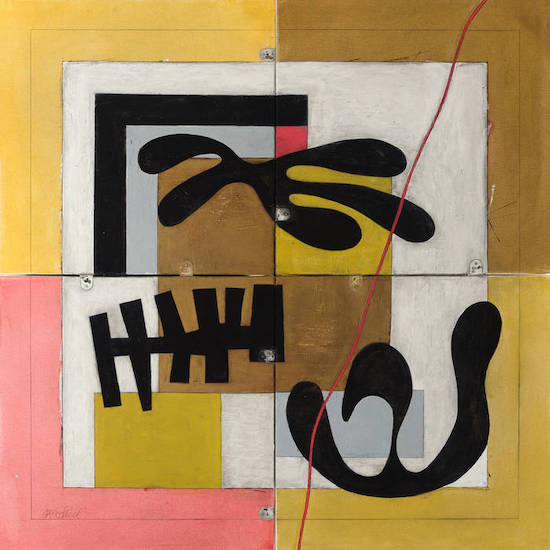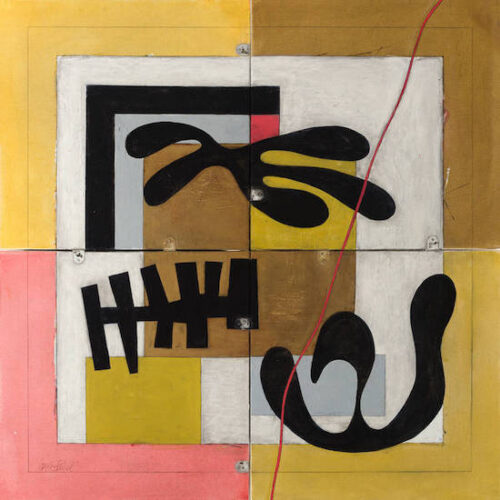It is as if Ashley Paul’s spaciously experimental, playfully contrasting aesthetics have been eerily anticipating our strange times, finally locking into the larger zeitgeist with her spellbinding new album, Ray.
The London-based multi-instrumentalist’s latest collection of delightful oddities features her newly formed trio with Yoni Silver (bass clarinet) and Otto Willberg (double bass). A sense of patched-togetherness permeates this lockdown suite, while feeling, still, uncannily cohesive. It’s hard to believe that Ray – an album whose organic texture recalls the closeness of an intimate venue – was assembled remotely, once more proving proximity overrated.
Paul’s sparse aesthetics of heavily deconstructed drawn-out melodies, focusing on the space in-between, stretch the definition of a song. Whilst never breaking completely out of form, her delicately balanced compositions follow a subtly erratic formula, ever informed by the spirit of free improvisation. It is a holistic and earnest snapshot of the process of creation, intimately linked to destruction, and their sacred and macabre dance. Paul respects the music’s deep tie to the wellbeing of the body and mind through feeling, creating the most serenely humane space, with the tender core carefully enveloped in the fiercly challenging outer layer.
On Ray, her prolonged, high-pitched screeching – experiments that earned her the reputation of making “the most hardened noise guys’ hair stand up on the back of their necks” (Pete Swanson) – hush down into a twisted delicacy, a window into enchanted domesticity under lockdown. She charts the simple, poetic intricacies of her daily routines – like gardening, communing with nature, or playing with her four-year-old, creating a bubble of joy. ‘Little Butterfly’is a sort of nursery rhyme for avant-gardeners. Its poised, but distuned vocal take anchored by the mantric plucking of the bass string, showing Paul’s delight in gently grating the ear, stretching its comfort zone.
Paul’s art remains uncompromisingly singular, thanks to her non- compartmentalizing, genre-b(l)ending, intuitive musical vision. She has always guarded her inner space, where the music happens, while generously drawing us into the eerie sphere of self-intimacy. This is process music with an inviting, eloquent silence at its core, feeling like a dialogue. She is gatekeeping the sharply divided zones of the inner and outer. And Ray is a shield to the unbearable outside, a spiritual self-preservation tool. Its mode of deep isolation is a fascinating blend of the joyous and elegiac, blissed out and conflicted.
“Over the past six months I’ve found myself needing music in a new way, a way of coping. I found again albums I had loved in the past, full of melody and humour, to cancel out the barrage of terrible news happening outside”, Paul admits. Ray delivers a raw and tender snapshot of the sharpening contrasts between the extreme simplification of life and the growing psychological complexity underneath, a contrast Paul’s sonic explorations have always reflected. It is at once mourning the loss of the innocent simplicity of life and lamenting on the things we lost, including a sense of time (as in ‘Lost Memories’).
The lockdown era has intensified the repurposing of everyday life activities into ritualised coping strategies. The psychological labour needed to keep some kind of balance is growing exponentially too, with the overwhelming complexity of the outside world barging in. We find ourselves seeking a remedy in the simple joys of life. But nothing is simple anymore – if it ever was.
We should be wary of what Mark Fisher called the “privatisation of stress”, as collective trauma that rests on systemic faults cannot be fully remedied individually. But that needn’t entail the neglect of personal self-care. Ray is crafting a new transitional space to be in: a breathing space during a great pause, a safe zone for the psychological reset, a comfortably unstable realm Ashley Paul is guiding us how to peacefully exist in.



